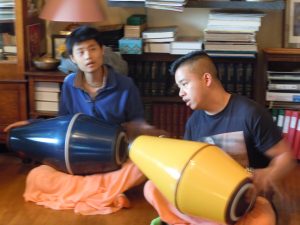SB 7.15.70—I had a beautiful face and a pleasing, attractive bodily structure. Decorated with flower garlands and sandalwood pulp, I was most pleasing to the women of my city. Thus I was bewildered, always feeling lusty desires.
PURPORT-From the description of the beauty of Nārada Muni when he was one of the denizens of Gandharvaloka, it appears that everyone on that planet is extremely beautiful and pleasing and always decorated with flowers and sandalwood. Upabarhaṇa was Nārada Muni’s name previously. Upabarhaṇa was specifically expert in decorating himself to attract the attention of women, and thus he became a playboy, as described in the next verse. To be a playboy in this life is unfortunate because too much attraction to women will lead one to fall into the association of śūdras, who can easily take advantage of mingling with women without restriction. In this present age of Kali, when people are mandāḥ sumanda-matayaḥ—very bad because of a śūdra mentality—such free mingling is prominent.
SB 7.15.71-Once there was a saṅkīrtana festival to glorify the Supreme Lord in an assembly of the demigods, and the Gandharvas and Apsarās were invited by the prajāpatis to take part in it.
PURPORT-Saṅkīrtana means chanting of the holy name of the Lord. The Hare Kṛṣṇa movement is not a new movement as people sometimes mistakenly think. The Hare Kṛṣṇa movement is present in every millennium of Lord Brahmā’s life, and the holy name is chanted in all the higher planetary systems, including Brahmaloka and Candraloka, not to speak of Gandharvaloka and Apsaroloka. The saṅkīrtana movement that was started in this world five hundred years ago by Śrī Caitanya Mahāprabhu is therefore not a new movement. Sometimes, because of our bad luck, this movement is stopped, but Śrī Caitanya Mahāprabhu and His servants again start the movement for the benefit of the entire word or, indeed, the entire universe.
SB 7.15.72 Narada muni continued: Being invited to that festival, I also joined, and, surrounded by women, I began musically singing the glories of the demigods. Because of this, the prajāpatis, the great demigods in charge of the affairs of the universe, forcefully cursed me with these words: “Because you have committed an offense, may you immediately become a śūdra, devoid of beauty.”
purport….But here we find that millions and millions of years ago, when Nārada Muni was a Gandharva, he neglected the order to glorify the Lord, and being mad in the association of women, he began to chant otherwise. Thus he was cursed to become a śūdra. His first offense was that he went to join the saṅkīrtana party in the company of lusty women, and another offense was that he considered ordinary songs, like cinema songs and other such songs, to be equal to saṅkīrtana. For this offense he was punished with becoming a śūdra.
SB 7.15.73 purport…It doesn’t matter whether a person is born as a śūdra, a woman or a vaiśya; if he associates with devotees repeatedly or always (sādhu-saṅgena), he can be elevated to the highest perfection. Nārada Muni is explaining this in relation to his own life. The saṅkīrtana movement is important, for regardless of whether one is a śūdra, vaiśya, mleccha, yavana or whatever, if one associates with a pure devotee, follows his instructions and serves the pure devotee, his life is successful. This is bhakti.
SB 7.15.74-The process of chanting the holy name of the Lord is so powerful that by this chanting even householders [gṛhasthas] can very easily gain the ultimate result achieved by persons in the renounced order. Mahārāja Yudhiṣṭhira, I have now explained to you that process of religion.
PURPORT-This is a confirmation of the Kṛṣṇa consciousness movement. Anyone who takes part in this movement, regardless of what he is, can gain the topmost result achieved by a perfect sannyāsī, namely brahma jñāna (spiritual knowledge). Even more important, he can advance in devotional service. Mahārāja Yudhiṣṭhira thought that because he was a gṛhastha there was no hope of his being liberated, and therefore he asked Nārada Muni how he could get out of material entanglement. But Nārada Muni, citing a practical example from his own life, established that by associating with devotees and chanting the Hare Kṛṣṇa mantra, any man in any condition of life can achieve the highest perfection without a doubt.
Today’s darshan-this outfit is comprised of three of Krsna’s
favorite colors— green, yellow, & red (as mentioned in KB)



